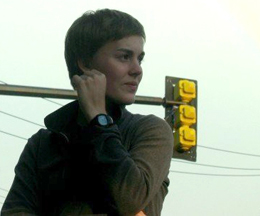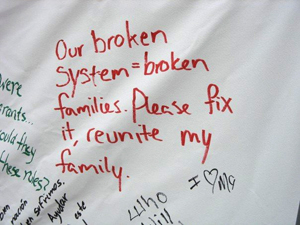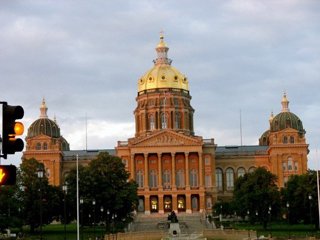Krista Ehst
kehst@mosaicmennonites.org
 As our rental mini-van approached the Twin Cities, Steve Kriss turned down the radio and raised his voice a few notches so those of us curled up in the back seat could hear. Steve, Jessica Walter, Ale Lopez, Felicia Moore, Sheldon Good, and I had driven for two days, as we kicked-off a week long Midwest road trip. Steve offered a reminder of the purpose of our trip before we pulled into our first official destination. I was surprised when he started talking about the early church, thinking to myself how driving cross-country with our iPods, laptops, and gas station stops related to the early Christian church. But as Steve began telling the story of those early churches that spread quickly and sprang up all over the Roman empire, I felt some of Steve’s excitement and understood his comparisons.
As our rental mini-van approached the Twin Cities, Steve Kriss turned down the radio and raised his voice a few notches so those of us curled up in the back seat could hear. Steve, Jessica Walter, Ale Lopez, Felicia Moore, Sheldon Good, and I had driven for two days, as we kicked-off a week long Midwest road trip. Steve offered a reminder of the purpose of our trip before we pulled into our first official destination. I was surprised when he started talking about the early church, thinking to myself how driving cross-country with our iPods, laptops, and gas station stops related to the early Christian church. But as Steve began telling the story of those early churches that spread quickly and sprang up all over the Roman empire, I felt some of Steve’s excitement and understood his comparisons.
The early church was not a massive body concentrated in one place or community, but consisted of diverse groups of people spread far and wide. This did not mean, however, that individual churches existed independently or were completely isolated from one another. The Silk Road system, which Steve titled the “e-mail of the Roman empire,” enabled people from various churches to visit one another and made it possible for letters and writings such as Paul’s epistles to move between groups. No doubt each church functioned differently and faced unique challenges, but they were able to support one another and strengthen their bonds as followers of Christ through travel on the road.
The connections were not hard to find. Here were the six of us, each excited about and committed to the church, traveling across interstates and city streets and small town roads to meet with, support, and learn from people in places and spaces different from our own. We would worship with a small, non-traditional church in Minneapolis that is passionate about living out Jesus’ call radically within their unique and diverse neighborhood streets; be introduced to the Christ Community congregation, a “new” Mennonite church in Des Moines, Iowa that seeks to express and ground their theology in worship, creating a fascinating blend of Mennonite theology and Catholic-style of liturgical worship; visit with the pastor of Walnut Hill Mennonite Church in Goshen, Indiana and hear about the ongoing struggle it is to be a voice in the local community and live out their particular sense of calling. In the latter two congregations, we had the obvious connections of knowing John Tyson and Jordan Good, summer Ministry Inquiry Program participants who both attend Franconia Conference congregations, and a large part of our purpose was to be supportive of them as a group of young adults who could understand their experiences when they return home. But the trip became so much more than that as we engaged with other communities and experienced some of the many ways to articulate and be Mennonite — to be church.
I spent this past spring semester in Cambodia as part of Goshen College’s Study-Service Term. As I anticipated this time, I expected that my faith and relationship with God would grow and that my excitement about the global church would rise. Once in Cambodia, however, I found myself immersed in a culture with drastically different world views and unfamiliar expressions of Christianity. I wasn’t ready for how much these differences would impact me. Rather than turning to God in this new space, my faith felt irrelevant and unhelpful. I had a difficult time resonating with many of the forms of Christianity I encountered and wondered whether — in this place with non-Western world views that has experienced so much pain and suffering — Christianity and the God I worship are really what is needed for healing and wholeness.
 These questions were unsettling, to say the least. Throughout my college years, I have come to believe deeply in a God who crosses all boundaries and whose Spirit is active and present in the world; I have found faith in the life, death, and resurrection of Jesus Christ, trusting that he provides salvation from the cycles of violence of our world and enables every one of us to find healing and wholeness amidst our brokenness. I began to wonder: what if these beliefs were only relevant in a community I was at ease in? What happened if faith and salvation only worked and felt right when I was surrounded by people who came from the same place as me, articulated their theology similarly, worshiped in ways I enjoyed and connected with? I always thought I embraced diversity, but what if deep down I wanted everyone to be the same kind of Christian and same kind of Mennonite that I am?
These questions were unsettling, to say the least. Throughout my college years, I have come to believe deeply in a God who crosses all boundaries and whose Spirit is active and present in the world; I have found faith in the life, death, and resurrection of Jesus Christ, trusting that he provides salvation from the cycles of violence of our world and enables every one of us to find healing and wholeness amidst our brokenness. I began to wonder: what if these beliefs were only relevant in a community I was at ease in? What happened if faith and salvation only worked and felt right when I was surrounded by people who came from the same place as me, articulated their theology similarly, worshiped in ways I enjoyed and connected with? I always thought I embraced diversity, but what if deep down I wanted everyone to be the same kind of Christian and same kind of Mennonite that I am?
I continued wrestling with these questions as I returned home and transitioned quickly into an Anabaptist Mennonite History tour in Europe where my classmates and I had many conversations about what the global church means and how we can be connected with and have fellowship among groups who express their faith and theologies in so many contexts and forms. Is faith in Jesus Christ a strong enough connection, or does there need to be more in common? Of course, these discussions and thoughts are not only relevant across international boundaries, but within our own country. I think I have always known that neither Christianity nor Anabaptist/Mennonite identity can be neatly packaged or clearly defined, but my travels over the past six months have brought that reality to the foreground. This Midwest tour was no exception, as I was reminded that churches within the same town, let alone the same country, can look totally different.
While I was in Cambodia, these differences daunted me. In Europe, I started processing them. During and after our Midwest trip, the differences began to excite and enliven me. When we stopped at Missio Dei, a church in Minneapolis that is beginning the process of joining Mennonite Church USA and trying to learn about Mennonites, our host Mark Van Steenwyk asked each of us what is the most frustrating or irritating thing about being Mennonite. I answered that I sometimes get frustrated by how ambiguous the term “Mennonite” can be; that I sometimes wish for a clearer definition or a more consistent expression of Mennonite faith and beliefs. These frustrations are real: it is hard for me to engage with fellow Mennonites who worship and believe much differently than I without being at least a little judgmental or skeptical. But as the trip progressed and I thought back to that conversation, I realized those frustrations are greatly outweighed by the blessings of being in such a diverse and multi-faceted body of believers who all resonate with the same tradition and broader identity.
 Each congregation we visited connected with the Anabaptist tradition and Mennonite church, and each expressed this connection in different ways. None was perfect but each taught me or reminded me of something of great value. Missio Dei is excited by the radical nature of the early Anabaptist movement and by the strong focus Anabaptists/Mennonites place on scripture and the teachings of Christ. They reminded me that it is possible to live our faith radically and that many times the words of Christ lead us to radical action. The Christ Community congregation of Des Moines focused strongly on bridging the gap between academic theology and the life of the congregation, which gave me some exciting ideas for how congregations can begin developing and articulating their theologies. Pastor Jane Buller, who met with our group at Walnut Hill, spoke of how a space was made for her to enter into leadership, reminding me that there is a place for me in this church that I claim as my own.
Each congregation we visited connected with the Anabaptist tradition and Mennonite church, and each expressed this connection in different ways. None was perfect but each taught me or reminded me of something of great value. Missio Dei is excited by the radical nature of the early Anabaptist movement and by the strong focus Anabaptists/Mennonites place on scripture and the teachings of Christ. They reminded me that it is possible to live our faith radically and that many times the words of Christ lead us to radical action. The Christ Community congregation of Des Moines focused strongly on bridging the gap between academic theology and the life of the congregation, which gave me some exciting ideas for how congregations can begin developing and articulating their theologies. Pastor Jane Buller, who met with our group at Walnut Hill, spoke of how a space was made for her to enter into leadership, reminding me that there is a place for me in this church that I claim as my own.
If I were to spend more time with these congregations, I would undoubtedly find things that turn me off, just as I was critical of some parts of churches I met in Cambodia. But if I were to allow those points of tension to shut me off or divide me from other bodies, I would be missing out on opportunities to grow, learn, and broaden my own sense of Mennonite and Christian identity. Looking back on my experiences of the Christian church in Cambodia, I am able to move beyond some of my critiques and recognize the hope and healing many Cambodians are finding in this crazy thing called Christianity. Our common source of hope is surely enough to cross boundaries and enable us to learn from one another.
Considering Steve’s minivan lecture, it is fascinating to think that — although on a smaller scale — the church has been both struggling with and benefiting from diversity within its midst since the very beginning. I am sure many of those early churches had a hard time understanding one another. Our differences can be difficult, even painful, but if we let them push us into conversation and contact with each other, rather than isolating ourselves, our limited understandings of God and salvation in Christ will likely be strengthened and deepened.
Krista Ehst of Bally, PA, will be a senior at Goshen College this fall, majoring in Bible, Philosophy and Religion. She is currently interning at Franconia Conference as part of Goshen College’s Service Inquiry Program. Last summer she interned with Emmanuel Mennnonite Church in Gainesville, FL. Krista is a member of the Perkasie (PA) congregation and a graduate of Christopher Dock Mennonite High School.
Photos by Jessica WalterÂ
The opinions expressed in articles posted on Mosaic’s website are those of the author and may not reflect the official policy of Mosaic Conference. Mosaic is a large conference, crossing ethnicities, geographies, generations, theologies, and politics. Each person can only speak for themselves; no one can represent “the conference.” May God give us the grace to hear what the Spirit is speaking to us through people with whom we disagree and the humility and courage to love one another even when those disagreements can’t be bridged.

Krista, those are some great questions to ask … and continue asking ourselves.
I want to know more about the church that is combining Catholic liturgy and Mennonite theology. Keep writing and thinking, Krista! Thanks, Dawn N.
It’s very funny to me that you went expecting to find alot of answers…but instead came back with some difficult questions. I wanted to remind you that you are not alone in your questions, even doubts and fears. Even though you have alot of frustrations, I see it as a leap of faith to be bold enough to test them in the first place. Keep using your experiences to grow and to grow others…like me